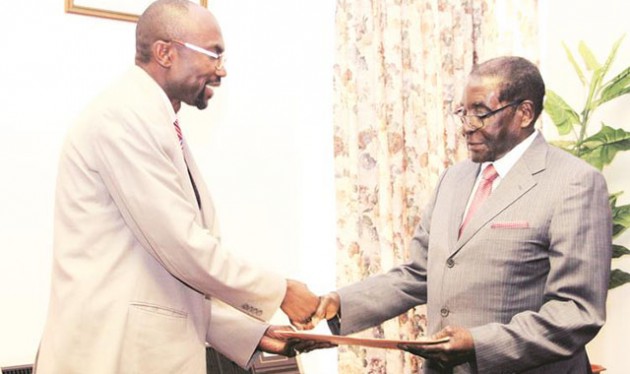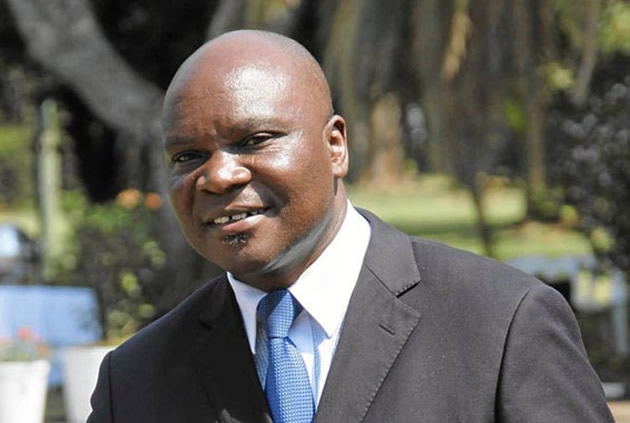Gambia envoy meets President


President Mugabe receives a document from Republic of Gambia Minister of Environment, Climate change , Water, Forestry and Wildlife Pa Ousman Jarju at his Munhumutapa Offices in Harare yesterday. — (Picture by Innocent Makawa)
Fidelis Munyoro Chief Court Reporter
A special envoy from Gambia yesterday met President Mugabe and held talks on biodiversity conservation and the impact of climate change on the African continent.
Speaking after meeting President Mugabe at his Munhumutapa Offices in Harare, Gambian Minister of Environment, Climate Change, Water, Forestry and Wildlife Honourable Pa Ousman Jarju said he had come to convey a message from his country’s president Yahya Jammeh to President Mugabe on bilateral issues between the two countries.
“We want to see how we can conserve our bio-diversity particularly the protection of our wildlife,” said Mr Jarju.
“You know Gambia is a savannah country. We no longer have the big five. We know that wildlife are endangered species and you have a lot of them here. We want to work with the Government to see how we can conserve and protect them in the Gambia for the sake of the environment and prosperity.”
Mr Jarju said Gambia has provided a list of issues to the Government’s technical team to consider.
He expressed hope that more discussion will be held in future which may lead to a Memorandum of Understanding being signed by the two countries.
“As of now, we cannot discuss the finer details until the experts work on the way forward,” he said, adding, “We also discussed issues to do with climate change affecting the continent”.
Last year a Gambian delegation visited Gokwe for a peer review which was expected to see the town council establishing programmes to improve service delivery.
The delegation from Kanifing municipality in the Gambia visited the Midlands town under the International Peer Review (IPR) meant to improve the two municipalities’ capacity to improve service delivery.
Mr Pa Kalifa Sanyang the chief executive of Kanifing municipality and his delegation were presented with Gokwe Council profiles and departmental reports before being taken on a field tour of the key service delivery sites of the municipality. The IPR programme is an initiative of the Urban Councils Association of Zimbabwe (UCAZ) with the support of the European Union.
Mr Jarju also said that his country will work with other African governments on common position on wildlife issues at the CITES conference to be held in South Africa in September this year. The World wildlife conference in Johannesburg will bring the global community together to tackle the world’s biggest wildlife challenges and opportunities.
With 181 Parties, CITES remains one of the world’s most powerful tools for biodiversity conservation through the regulation of trade in wild fauna and flora.
Thousands of species are internationally traded and used by people in their daily lives for food, housing, health care, eco-tourism, cosmetics or fashion. CITES regulates international trade in over 35 000 species of plants and animals, including their products and derivatives, ensuring their survival in the wild with benefits for the livelihoods of local people and the global environment.
The CITES permit system seeks to ensure that international trade in listed species is sustainable, legal and traceable. CITES was signed in Washington D.C. on March 3, 1973.










Comments